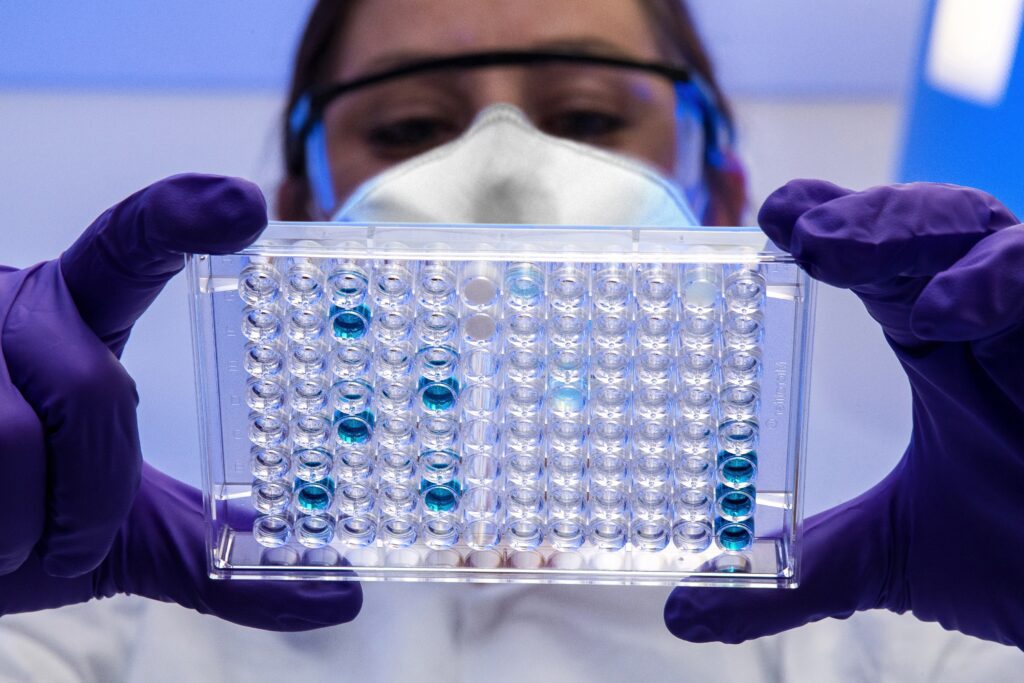Pros and Cons of Preimplantation Genetic Screening (PGS)-Risks and Benefits of PGS Testing

For intended parents undergoing in vitro fertilization (IVF), the embryo transfer marks the culmination of a long and hopeful journey. As part of this process, preimplantation genetic screening (PGS), also known as preimplantation genetic testing for aneuploidies (PGT-A), offers a crucial technique to screen viable embryos before transfer. We are going to discuss “Pros and Cons of Preimplantation Genetic Screening (PGS)” in IVF here.
PGS has become a rapidly evolving assisted reproductive technology, offering various benefits and considerations for prospective parents. In this comprehensive guide, we will delve into the pros and cons of preimplantation genetic screening, shedding light on why it may be a valuable option for some patients, while others may benefit from alternative approaches.
In the world of assisted reproductive technologies, Preimplantation Genetic Screening (PGS) has emerged as a significant advancement in the field of in-vitro fertilization (IVF).
PGS is a genetic testing technique that evaluates embryos before they are transferred to the uterus, with the goal of identifying chromosomal abnormalities and genetic disorders.
This innovative procedure has not only revolutionized the treatment of infertility but has also provided hopeful parents with the opportunity to reduce the risk of passing on devastating genetic diseases to their offspring.
Get in touch for a Free Surrogacy Consultancy:
📲 +91-8800481100 ( WhatsApp, Line, Viber)
Key Takeaways
- PGS is a powerful tool in IVF that helps identify chromosomal abnormalities and genetic disorders in embryos before they are transferred to the uterus.
- PGS increases the chances of selecting healthy and viable embryos, improving the success rates of IVF treatments.
- PGS can reduce the risk of passing on devastating genetic diseases to offspring and may lower the likelihood of recurrent miscarriage.
- The technique has its limitations, and further research is ongoing to optimize its clinical utility.

What is PGS/PGT-A?
Preimplantation genetic screening (PGS/PGT-A) is a process that involves identifying the number of chromosomes present in each selected embryo.
The normal chromosome count in a healthy embryo is 46, and deviations from this number, known as aneuploidy, can significantly impact the chances of successful conception and birth.
By performing PGS/PGT-A, fertility doctors can ensure that embryos chosen for transfer have a healthy number of chromosomes, reducing the risk of abnormalities that may affect the pregnancy.
The Procedure: How PGS is Performed
Before PGS testing, we follow the standard IVF procedure, where the egg is fertilized by the sperm and allowed to divide into multiple cells over five days. Subsequently, one or more cells are carefully removed from the embryos for analysis, and the embryos are then frozen.
The cell’s DNA is examined to determine the number of chromosomes present. Our experienced fertility doctors will select the highest quality embryos for transfer into the uterus, while any remaining good quality embryos can be frozen for future use.

Who Should Consider PGS Testing?
PGS testing is recommended for couples or individuals who may be at risk of abnormal embryos.
- If you have a history of genetic problems that may be passed on to your offspring or if you have experienced several failed fertility treatments or recurrent miscarriages, including chemical pregnancies, PGS may be an essential option for you.
- Additionally, for those seeking IVF after the age of 35, PGS can be a valuable tool in increasing the chances of a successful pregnancy
The Timeframe for PGS Testing
If you choose to undergo PGS testing alongside IVF, it is essential to allow an additional 7-10 days for the embryos to be screened before implantation. PGS can be performed on fresh embryos on day 3 of development, but we recommend performing it on day 5 embryos for the best results and to minimize risks.
Considering Alternatives: PGD and Prenatal Screening
At IVF Conceptions, we recognize that each individual’s fertility journey is unique. In addition to PGS testing, we offer other options for genetic testing and prenatal screening, including Preimplantation Genetic Diagnosis (PGD) and prenatal screening procedures:
- PGD: A more specific test aimed at identifying gene mutations linked to certain genetic disorders. Our team will guide you on whether PGD is a suitable option based on your genetic history.
- Chorionic Villus Sampling (CVS): This procedure involves sampling cells from the placenta between weeks 10-12 of pregnancy for analysis of chromosomal or genetic disorders in the fetus.
- Amniocentesis: This procedure involves sampling cells from the amniotic fluid between weeks 16-18 of pregnancy to screen for chromosomal or genetic disorders in the fetus.
- Ultrasound and Blood Tests: These tests can provide additional information about potential genetic problems during pregnancy.
Success Rates with PGS Testing
At IVF Conceptions, we have witnessed the significant impact of PGS testing on IVF success rates. Our fertility doctors report success rates of 65-80%, which are considerably higher than the average of 40-50% reported in regular IVF cycles.
We believe in the power of PGS testing to transform your IVF journey, increasing your chances of achieving a healthy pregnancy and bringing a precious little one into your life.

Pros of Preimplantation Genetic Screening
1. Improved Embryo Selection
One of the primary advantages of PGS is the increased likelihood of a successful and healthy conception for prospective parents.
PGS testing minimizes the risk of miscarriage, shortens the time of pregnancy, and reduces the need for transferring multiple embryos.
While there might be additional costs associated with PGS, it often proves cost-effective in the long run by reducing the number of transfers required to achieve successful conception.
2. Gender Selection (if Desired)
PGS/PGT-A offers the possibility of gender selection, also known as Family Balancing or Family Planning.
This allows intended parents to identify the sex chromosomes of each embryo and select the embryo(s) of their desired gender.
The reasons for gender selection are deeply personal and varied, ranging from family balance preferences to medical considerations. Our fertility clinic respects each individual’s unique circumstances and assists in making informed decisions.
3. Prevent Genetic Transmission of Unknown Abnormalities
While PGS/PGT-A does not specifically test for certain diseases, it identifies chromosomal abnormalities in terms of their number and position.
This enables fertility doctors to select chromosomally normal embryos, thus minimizing the risk of unhealthy births, even in cases where the embryos appear high-quality during screenings.
For individuals with known genetic disorders, preimplantation genetic diagnosis (PGD) might be a more suitable alternative.
4. Optimized Chance of a Successful Pregnancy
PGS provides valuable insights into which embryos are most likely to successfully implant and develop healthily.
By understanding the specific abnormalities that may prevent successful implantation or development, doctors can optimize the IVF process and increase the chances of a successful pregnancy.
5. Quicker Time to Pregnancy
With the aid of PGS/PGT-A, fertility clinics can avoid unsuccessful embryo transfers by prioritizing the transfer of the healthiest embryos first.
Understanding which embryos are most likely to lead to a full-term pregnancy streamlines the process, ensuring that intended parents do not spend months attempting transfers that may not result in successful pregnancies.
6. Reduced Monetary Burden
Although PGS testing might involve additional expenses depending on the provider and payment options, it provides invaluable insights into which embryos are suitable for transfer and freezing. This information allows intended parents to make informed decisions, leading to cost savings in the long term by avoiding unnecessary transfers.
7. Less Uncertainty
For prospective parents undergoing IVF, the reduction in uncertainty is a significant benefit of PGS/PGT-A.
With PGS, parents are assured of healthy embryos, a lower risk of pregnancy loss, and reduced emotional stress, especially for those who have previously experienced the pain of miscarriage.
8. Identify Fertility Treatment Options
PGS may reveal genetically flawed embryos that cannot be transferred to the uterus. While this can be heartbreaking, fertility doctors will guide intended parents through the best course of action, setting the stage for a successful and healthy conception and pregnancy.

Cons of Preimplantation Genetic Screening
1. Additional Time and Costs
IVF is a complex and costly procedure, particularly when utilizing a gestational carrier (surrogate) to carry the child. The price of PGS/PGT-A testing can range between $4,000 and $10,000 for screening eight embryos.
The exact cost will vary based on individual factors and the clinic’s policies, such as the number of IVF cycles required, the number of embryos tested, the genetic disease inheritance pattern, and the technology used for testing.
2. Can’t Determine Specific Conditions Present
If one or both intended parents have known genetic diseases and are using their sperm and eggs for embryo creation, PGS/PGT-A cannot determine specific conditions present in the embryo’s chromosomes.
In such cases, preimplantation genetic diagnosis (PGD) is a more suitable approach for identifying specific genetic disorders.
3. No Guarantees or Promises
It is important to recognize that manipulating genes is akin to playing roulette, where the odds can be influenced but outcomes are not guaranteed. While PGS/PGT-A can increase the chances of successful conception, other factors such as the fertility clinic’s success rates also play a role. PGS/PGT-A only tests a few cells, and while it has become more effective over time, there remains a slight margin of error.
4. Invasiveness of the Procedure
While advances in the biopsy and freezing process have significantly reduced the risk of embryo damage, there remains a possibility of harm during the procedure. However, when executed properly, PGS/PGT-A/PGD should not damage the embryo, allowing for successful IVF embryo transfer afterward.
Is Surrogacy Baby Genetically Related To The Surrogate?
Should I Have PGS Testing on My Embryos?
Number of Embryos to Transfer in Surrogacy
IVF Conceptions Surrogacy Prices and Plans ( in 2023)

Understanding the Costs of PGS Testing
At IVF Conceptions, we are transparent about the costs associated with PGS testing. PGS is a specialized laboratory procedure, and the pricing depends on the number of embryos to be analyzed. As of the current date, the average costs for PGS testing of up to five embryos are as follows:
- IVF with PGS in the USA – starting from around $20,000
- IVF with PGS in Thailand – starting from around $12,500
- IVF with PGS in Malaysia – starting from around $12,000
- IVF with PGS in India – starting from around $8,000
- IVF with PGS in the UK – starting from around £9,000
- IVF with PGS in Spain – starting from around €8,000

FAQs- Pros and Cons of Preimplantation Genetic Screening (PGS).
1. What is PGS testing and why is it performed during IVF?
PGS testing, also known as preimplantation genetic screening, is a genetic test performed on embryos created through in vitro fertilization (IVF) to detect any chromosomal abnormalities or genetic disorders.
It involves the removal of a few cells, called embryo biopsy, from the developing embryo, which are then analyzed for the number and structure of chromosomes. PGS testing is performed to improve the success rate of the IVF treatment and increase the chances of a successful pregnancy.
2. What are the risks involved in PGS testing?
The risks associated with PGS testing are minimal. The embryo biopsy may cause some damage to the embryo, which can potentially lead to embryo loss or reduced implantation potential.
However, advancements in the technique have significantly reduced the risk of damage to the embryo. Additionally, there is a small risk of misdiagnosis or false-negative results, which may give a false sense of security regarding the chromosomal status of the embryos.
3. What are the benefits of PGS testing?
PGS testing offers several benefits for IVF patients. It allows the identification of chromosomally normal embryos, increasing the chances of a successful IVF cycle and pregnancy. By selecting embryos with the correct number of chromosomes, PGS testing helps to reduce the risk of miscarriage and implantation failure. It also helps in the identification of embryos without specific genetic diseases, providing peace of mind to prospective parents.
4. Is PGS testing necessary for all IVF patients?
PGS testing is not absolutely necessary for all IVF patients. It is typically recommended for patients with a history of recurrent miscarriages, failed IVF cycles, or advanced maternal age.
Additionally, PGS testing can be beneficial for couples with a known genetic disease who wish to avoid the risk of passing it on to their child.
5. How does PGS testing improve the success of IVF?
PGS testing improves the success of IVF by identifying chromosomally normal embryos that have a higher chance of implanting and developing into a healthy pregnancy. By selecting the embryos with the correct number of chromosomes, PGS testing helps to avoid implantation failure and miscarriage, leading to improved pregnancy rates and live birth rates.
6. What happens if all embryos are found to be abnormal during PGS testing?
If all embryos are found to be abnormal during PGS testing, it indicates that there are chromosomal abnormalities present in the embryos. In such cases, the IVF cycle may be canceled or postponed.
Conclusion for Pros and Cons of Preimplantation Genetic Screening
In conclusion, Preimplantation Genetic Screening (PGS) has ushered in a new era of precision in IVF treatments. With its ability to identify chromosomal abnormalities and genetic disorders, PGS offers hope and reassurance to couples facing infertility and genetic concerns.
By providing valuable insights into embryo viability and genetic health, PGS empowers prospective parents with the knowledge needed to make informed decisions on their path to parenthood.
By understanding the pros and cons of PGS/PGT-A, prospective parents can make informed decisions that align with their unique circumstances and goals.
Our dedicated team of fertility experts is here to guide you through the process, ensuring that you embark on your journey to parenthood with confidence and understanding.
If you have any questions or want to learn more about IVF with PGS testing and associated costs, please feel free to reach out to us using the contact form on this page.
Remember, at IVF Conceptions, your dream of parenthood is our shared mission.
Note: This article is intended for general educational purposes only and should not be considered a substitute for professional medical advice, diagnosis, or treatment. Please consult your doctor for personalized medical guidance.
Get in touch for a Free Surrogacy Consultancy:
📲 +91-8800481100 ( WhatsApp, Line, Viber)
Reference used:
ACOG Committee Opinion: Preimplantation Genetic Testing


